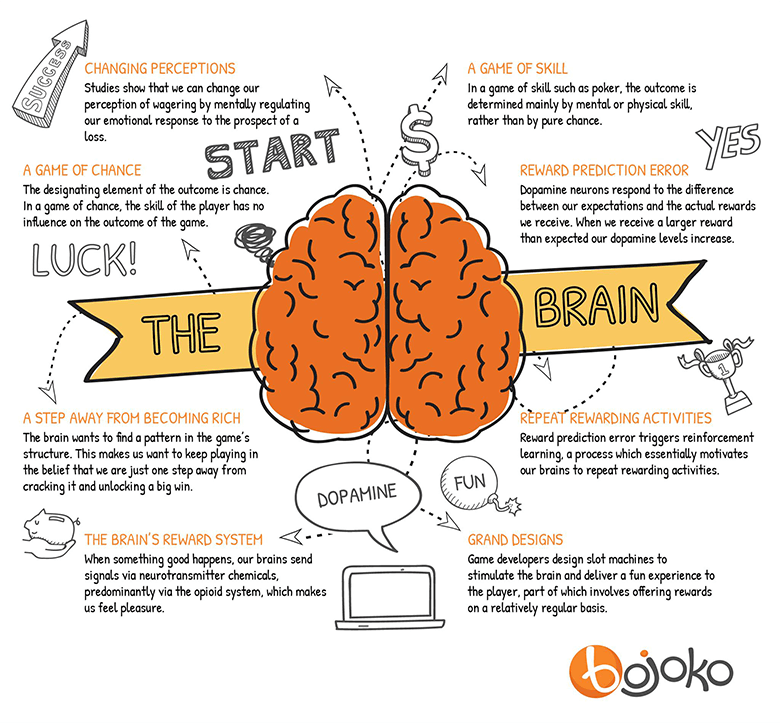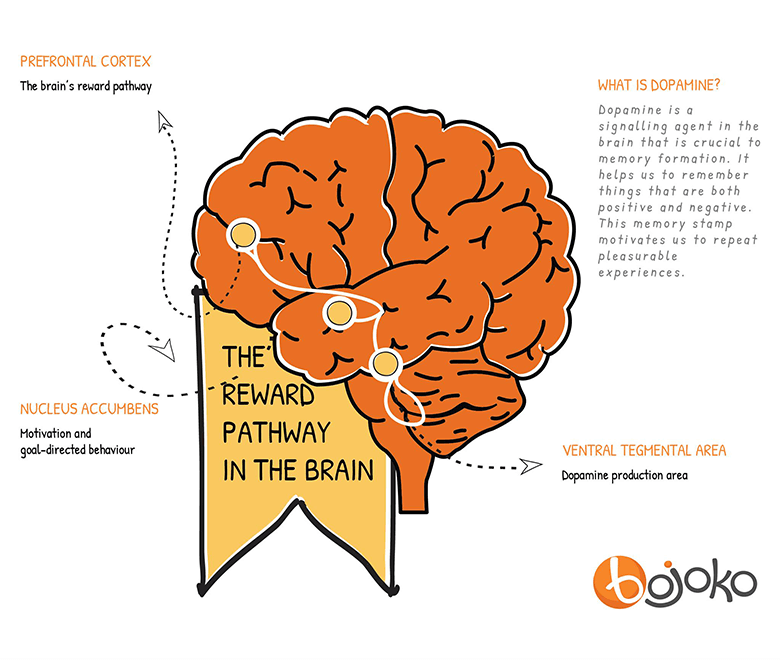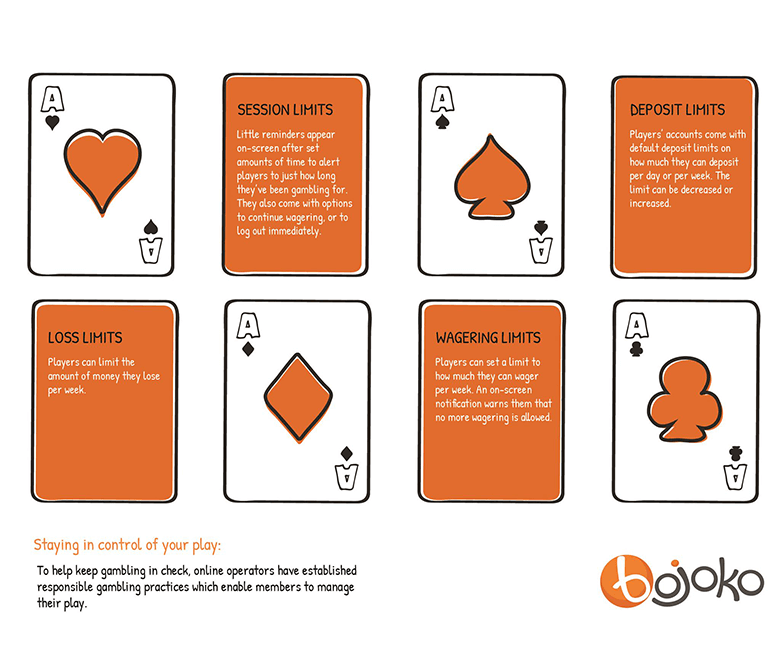The combination of risk, anticipation and adrenaline rush makes gambling so exhilarating, but what is it in the brain that compels us to bet? And how do game designers use psychology to deliver an engaging and thrilling experience to players?
Carpenter Darren Yates was over the moon when, ignoring his wife’s instructions, he placed a £60 bet on Frankie Dettori winning all seven races at Ascot in 1996.
Guess what? He managed to bag himself a tidy £550,000!
Over the years there have been many more like him, both casino players and sports bettors, some compulsive gamblers and others not. But one thing they all have in common is they undergo similar chemical and psychological processes when they bet and win.
Here’s how the human brain responds to events like this:

Betting effectively combines entertainment and expectation with the thrill of rewards.
Our brains have a series of circuits to cater for this, known as the reward system. These connect with various regions of the brain, including those that produce feelings of pleasure and motivation.
When something good happens – such as receiving a compliment, winning a prize or successfully completing a task – our brains send signals via neurotransmitter chemicals, predominantly via the opioid system, which makes us feel pleasure.
Dopamine is also released and is involved in the incentive salience – or “wanting” aspect of gambling.
This gives us the motivation to seek out and acquire specific rewards, as well as helping us distinguish which events lead to rewards.
As with all pleasurable experiences, we're wired to want to repeat them over and over again.
Unfortunately, if activated too often, dopamine levels become weaker and weaker to a point where serious gamblers are constantly looking for their next win to appease their dopamine deficiency.

Dopamine neurons respond to the difference between our expectations and the actual rewards we receive.
This so-called “reward prediction error” is strongest when we receive a larger reward than we are expecting – like a random jackpot prize – leading to higher dopamine levels.
At a less extreme level, Professor Ron Riggio, from Kravis Leadership Institute, California, says: “the process is pretty much like anticipating any positive outcome – getting an affirmative response when asking someone out on a date, getting applause and kudos for a speech, etc.”
Reward prediction error triggers reinforcement learning, a process which essentially motivates our brains to repeat rewarding activities.
So it’s easy to see how casino games at the best uk online casinos are so hugely popular: slots players know that they will get a reward sometime but they never know exactly when… which motivates them to keep on playing.
Meanwhile, near misses simply induce feelings of regret and the only way to erase them is to keep on playing until the next win. Once players feel the thrill of winning again, they “need” to repeat the rewarding activity, and the cycle continues.
Risk and reward are further elements that lead many of us to the thrill of placing bets while anticipating the positive rush of winning.
This could be why Darren Yates risked the wrath of his wife to win £550,000.
Reward is all too obvious a motivation but what about those gamblers whose overriding emotion is not anticipation of winning, but fear of losing?
Many gamblers invest time and money in chasing losses in order to alleviate past disappointments. At this point, winning becomes less about thrills and more about making up for lost money.
Dr Alison Harris from the Department of Psychology at Claremont McKenna College says:
Take this easy-to-imagine analogy:
You're invited to bet £10 on a coin toss. If the coin lands on heads, you lose your money. If it lands on tails, you receive £15. Is this an attractive bet? Do you accept?
For most people, the fear of losing £10 is greater than the hope of winning £5.
Daniel Kahneman, the Nobel Memorial prize-winning Israeli-American psychologist notable for his work on the psychology of judgment and decision-making, has conducted several studies on this. He concludes:
His studies have also shown that most people don’t bet if they can't win about double more than they would lose.
Others believe that gambling has never been and will never be for them. However, studies also show that we can change our perception of betting by mentally regulating our emotional response to the prospect of loss.
In one notable example, laboratory participants who were instructed to “think like a trader” showed considerably less loss aversion in a gambling task.
Whether you’re spinning slot machines, betting on the horses, or playing blackjack or roulette, the odds are stacked to ensure the casino or bookmaker doesn’t lose out.
Why then, do so many people continue to play despite the overwhelming likelihood of losing money?
Dr Luke Clark from the Department of Experimental Psychology at the University of British Columbia examines how gamblers overestimate their chances of winning.
He also studies the effects of near-misses and personal choice. He confirms that people enjoy the "illusion of control"; the belief that they can somehow use skill to create an outcome that is, in fact, solely defined by chance.
Despite the reality, gamblers are still compelled to win. Dr Clark measures activity in the brain’s reward circuit as volunteers experience near-misses and the effects of choice during gambling tasks.
He has found that both near-misses and personal choice cause gamblers to play for longer and to place bigger bets to try recouping their losses.
Why? Because it’s human nature to want to feel in control.
The frustration we feel from the unpredictability of gambling can often lead us to convince ourselves that we can gain some control over it.
This is akin to superstition: throwing dice in a particular way, wearing a "lucky" item of clothing or sitting in a particular place.
Essentially, in the mind of a serious gambler, the brain yearns to find a pattern in the game's structure, so much so that it keeps on playing in the firm belief that it's only one step away from becoming rich.
“Professional” casino and sports bettors devote most of their time to evaluating risks and mathematically calculating probabilities associated with their preferred games.
In 2008, professional poker player Peter Eastgate beat 6,843 rivals to become the youngest player ever to win the Main Event at the World Series of Poker, at age 22.
He earned $9,152,416. But Eastgate did not achieve this just by chance.
Unlike slots, some strategically played casino games like poker and blackjack, along with sports betting, require a level of skill – plus a bit of old-fashioned good luck – for players to win.
While all casino games involve probabilities and statistics, only skill-based games enable players to win in the long run. To do this, they must analyse the probabilities and statistics to guide their decisions and actions.
Successful sports bettors must also diligently study things like underdogs, injuries and odds comparisons with the same fervour.
A game of skill is a game, contest, or amusement of any kind in which the ruling factor of the outcome is the judgment, skill, or deftness of the participant in the contest and not chance.
In skill-based games, the outcome is determined mainly by mental or physical skill, rather than by pure luck.
Examples of skill-based games:
A game of chance, on the other hand, is governed exclusively by chance. In chance-based games, the skill of the player has no influence over the outcome of the game.
Examples of chance-based games:

Understanding the psychology behind making a bet is important to game developers, who use this knowledge to make their games as fun and exciting as possible.
Game developers design slot machines in such a way as to encourage people to keep on playing. Part of this involves offering them rewards on a somewhat regular basis.
Using a technique called clustering, they program more near-wins than wins, meaning players can often miscalculate their winning probabilities.
In short, dopamine-charged gamblers who nearly hit the jackpot keep on playing because their brains are led to think they have a good chance of winning.
Kevin Reid, chief operating officer at 1X2 Network, reminds us that control is key:
Mobile casino patrons demand more engaging game experiences than those made for desktop, laptops or tablets.
Limited time and capabilities on mobile dictate the need to manufacture compelling, mobile-friendly games that snatch players' attention and keep them coming back for more.
First-time user experience is usually key to the long-term success of a game. Good developers ensure they create games that are not only visually striking but also soothing to the eye during repeated play – both vital elements to player engagement.
Reid adds that in addition to graphics, he looks to:
Sometimes designers incorporate tie-ins, normally involving popular cultural elements such as a specific movie, character or event.
Stringent copyright rules can turn this into quite the professional challenge. Non-branded games are equally challenging as game designers have to brainstorm ways to make them stand out from hordes of others in the marketplace.
Designers are bound by a memo for unique and exciting games that aren't too complicated in terms of project execution.
Careful consideration of demographics ensures that game designs appeal to their target audiences.
Psychology is also important when offering a particular demographic the kind of rewards it expects – whether that’s fixed prizes or a long sequence of small prizes.
In terms of maths and mechanics, 1X2 Network, a UK provider of slots, table games and virtual sports betting, tells us that analytics of demographics and probabilities enable them to produce games that suit player and operator requirements.
The math can be complex and varies from game to game, be it a simple framework for games like its Football 3x3 title or more complex for the multiple paylines of its Rainbow Wilds slot.
While stimulating players with fun, easy gameplay and rewards, game developers must carefully take on board the issue of responsible gaming.
With features that prompt players to stop gaming after a select amount of time, as well as alerts received for a selected decrease in cash value, these games enable and encourage people to play responsibly.
Gambling addiction is now classed as a disorder by the World Health Organisation (WHO).
The symptoms listed by WHO echo those for other addictive disorders: lack of control, prioritising gambling over other interests and activities, and continuation of or increased gambling despite negative consequences.
It’s important to bear in mind that after isolated instances of gambling, no harm is done and the brain’s dopamine levels return to normal without difficulty.
However, with repeated activity, gamblers’ brains develop a strong, long-lasting resistance to dopamine, bringing on the urge to bet more to rekindle the same dopamine kick of the start.
Yet no matter how much they gamble, it doesn’t return. You might liken this to playing a game on your phone that was great in the beginning but after several game sessions, it stops being so much fun.
In this state of limbo, gamblers try to avoid depression by continuing to bet which, instead of leading to euphoria, simply precipitates feelings of withdrawal and sadness.
Gambling need not be problematic if it’s kept under control.
Just like other addictive behaviours, gambling is conducive to positive emotion association in some people's brains.
To combat this and break the cycle, you can "unlearn" the reward associations with gambling.
To help keep excessive gambling in check, online operators have established responsible gambling features and procedures that keep players within the realm of safety.
Limit increase timeframes are also enforced to ensure players don’t regret a limit change instantly.
So to guarantee continued safe play, limit increases and removals do not take effect immediately and can take up to seven days to be applied.
Gambling is often viewed as a negative experience, but in reality, it's an entertaining pastime enjoyed by millions of people around the world.
From betting on your favourite sports team, to playing a hand of blackjack, to hitting the jackpot on the latest blockbuster slot, there are many different ways to gamble healthily and have a good time.
By understanding the process that takes place in the brain when you bet, what makes it a thrilling activity to undertake, and the tools available to manage your gameplay, you can now enjoy the highs and lows of gambling in a safe and controlled way.